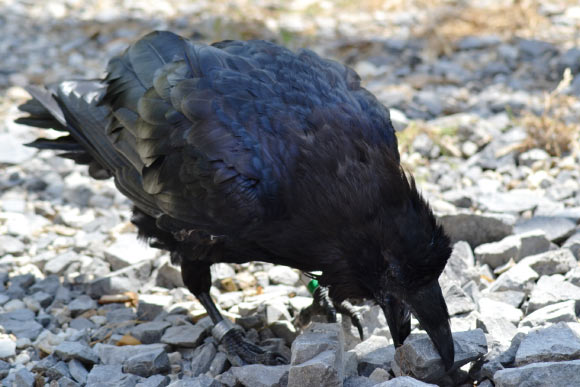According to a new study published in the journal Nature, ravens (Corvus corax) share human ability to think abstractly about other minds, adapting their behavior by attributing their own perceptions to others.

Ravens hid their food only well when dominant conspecifics were visible and audible at the same time. Image credit: Jana Müller / Universität Wien.
Recent studies purported to demonstrate that non-human animals like chimpanzees, monkeys and corvids possess a basic ‘Theory of Mind,’ the ability to attribute mental states – including vision – to others.
However, these studies remain controversial because they share a common confound: the other’s head orientation or line of gaze, which could serve as an associative cue.
The current study, led by University of Vienna researcher Thomas Bugnyar, is the first to rule out this confound.
Dr. Bugnyar and co-authors tested ravens for their understanding of ‘seeing’ as mental state, using the birds’ predisposition to compete for hidden food.
In a first step, the birds showed cache protection behaviors when dominants were visible but not when they were just audible in the adjacent room. In the next step, they were introduced to a small peephole, which allowed them to peek into the adjacent room.
With the peephole being open, the ravens instantly guarded their caches against discovery when they now could hear dominants in that room.
The presence of dominants was simulated via playback of sounds. Hence, there were no behavioral cues that ravens could orient on. Yet, they behaved as if someone could see them.
“The findings offer needed information in several arenas, including evidence that ravens could serve as animal models in research involving social cognition,” said study co-author Dr. Cameron Buckner, of the University of Houston.
“The results indicate that ravens mentally integrate information about the others’ audible presence and their own visual experience of seeing through the peephole, which fits one of the recent hypotheses of how a Theory of Mind could work,” Dr. Bugnyar said.
“The study offers new evidence about the capacities involved in Theory of Mind and abstract thinking,” Dr. Buckner added. “It could change our perception of human uniqueness, that we share some of that ability not just with chimpanzees and closely related species but also with a very different species.”
He said: “the next step will be to see which other animals are capable of the kind of abstraction assessed in the peephole test, especially humans, since we don’t know when this ability emerges in childhood.”
_____
Thomas Bugnyar et al. 2016. Ravens attribute visual access to unseen competitors. Nature Communications 7, article number: 10506; doi: 10.1038/ncomms10506







